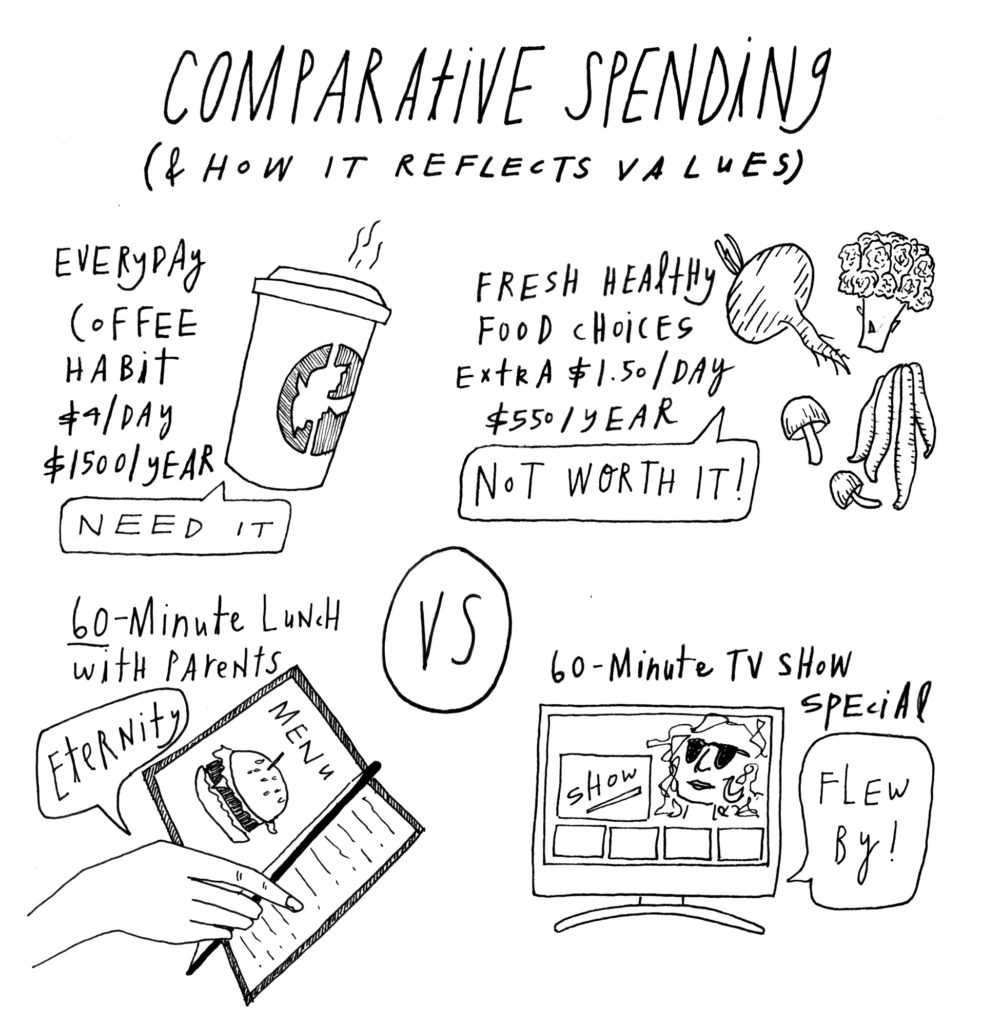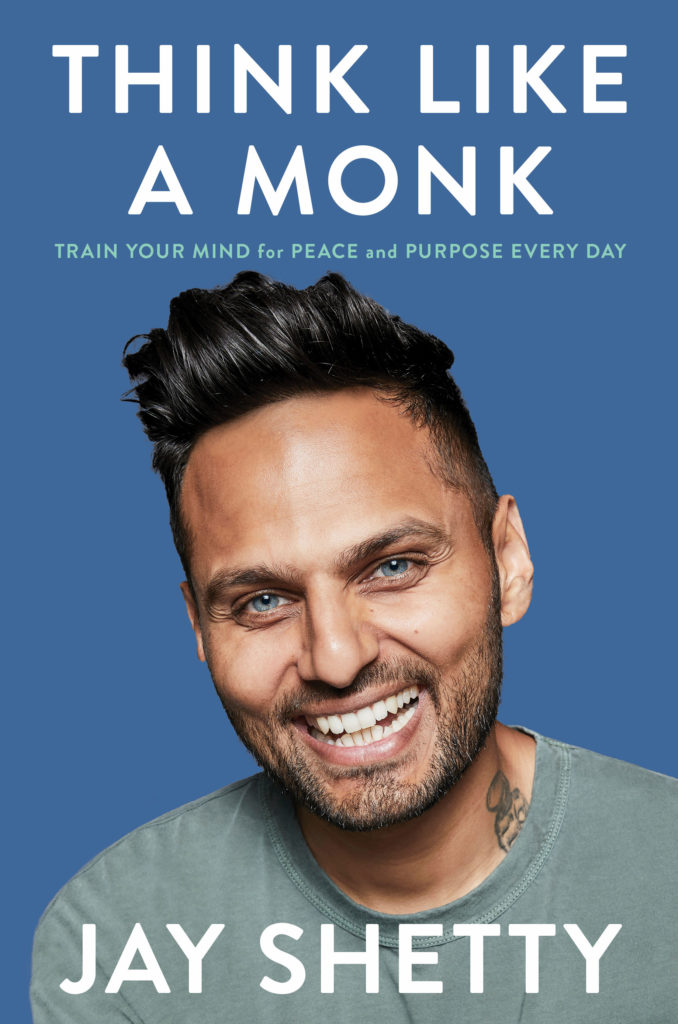Audit Your Life
No matter what you think your values are, your actions tell the real story. What we do with our spare time shows what we value. For instance, you might put spending time with your family at the top of your list of values, but if you spend all your free time playing golf, your actions don’t match your values, and you need to do some self-examination.
Time
First, let’s assess how you spend the time when you’re not sleeping or working. Researchers have found that by the end of our lives, on average, each of us will spend thirty-three years in bed (seven years of which we’ll be trying to sleep), a year and four months exercising, and more than three years on vacation. If you’re a woman, you’ll spend 136 days getting ready. If you’re a man this number drops to 46 days. These are just estimates of course, but our daily choices add up.
Media
When you did your audit, no doubt a significant amount of your time was spent reading or viewing media. Researchers estimate that, on average, each of us will spend more than eleven years of our lives looking at TV and social media! Perhaps your media choices feel casual, but time reflects values.
There are many forms of media, but most of us aren’t overdoing it on movies, TV, or magazines. It’s all about devices. Conveniently, your iPhone will tell you exactly how you’re using it. Under Settings, look at the screen time report for the last week and you’ll see how much time you spend on social media, games, mail, and browsing the Web. If you don’t like what you see, you can even set limits for yourself. On Android, you can look at your battery usage under Settings, then, from the menu, choose “Show full device usage.” Or you can download an app like Social Fever or MyAddictometer.
Money
Like time, you can look at the money you spend to see the values by which you live. Exclude necessities like home, dependents, car, bills, food, and debt. Now look at your discretionary spending. What was your biggest investment this month? Which discretionary areas are costing you the most? Does your spending correspond to what matters most to you? We often have an odd perspective on what’s “worth it” that doesn’t quite make sense if you look at all your expenditures at once. I was advising someone who complained that the family was overspending on afterschool classes for the kids . . . until she realized that she spent more on her shoes than on their music lessons.
I saw some posts on social media comparing spending and our priorities. It got me thinking about how our spending shows what we value.
- A 60-minute TV show (“Flew by!”)
- A 60-minute lunch with parents (“Eternity!”)
- Everyday coffee habit ($4/day, almost $1,500/year) (“Need it!”)
- Fresh healthy food choices (an extra 1.50/day, about $550/year) (“Not worth it!”)
- 120+ minutes of Game of Thrones (“Me time!”)
- 15 minutes of meditation (“No time!”)
It’s all in how you see it. When you look at a month of expenses, think about whether discretionary purchases were long- or short-term investments—a great dinner out or a dance class? Were they for entertainment or enlightenment, for yourself or someone else? If you have a gym membership, but only went once this month and spent more on wine, you have some rethinking to do.

Curate Your Values
Doing a self-audit tells you the values that have crept into your life by default. The next step is to decide what your values are and whether your choices are in alignment with them. Contemplating monk values may help you identify your own. Our teachers at the ashram explained that there are higher and lower values. Higher values propel and elevate us toward happiness, fulfillment, and meaning. Lower values demote us toward anxiety, depression, and suffering. According to the Gita, these are the higher values and qualities: fearlessness, purity of mind, gratitude, service and charity, acceptance, performing sacrifice, deep study, austerity, straightforwardness, nonviolence, truthfulness, absence of anger, renunciation, perspective, restraint from fault finding, compassion toward all living beings, satisfaction, gentleness/kindness, integrity, determination.
The six lower values are greed, lust, anger, ego, illusion, and envy. The downside of the lower values is that they so readily take us over when we give them space to do so, but the upside is that there are a lot fewer of them. Or, as my teacher Gauranga Das reminded us, there are always more ways to be pulled up than to be pulled down.
We can’t pull a set of values out of thin air and make sweeping changes overnight. Instead, we want to let go of the false values that fill the space in our lives. The ashram gave us monks the opportunity to observe nature, and our teachers called our attention to the cycles of all living things. Leaves sprout, transform, and drop. Reptiles, birds, and mammals shed their skins, feathers, fur. Letting go is a big part of the rhythm of nature, as is rebirth. We humans cling to stuff—people, ideas, material possessions, copies of Marie Kondo’s book—thinking it’s unnatural to purge, but letting go is a direct route to space (literally) and stillness. We separate ourselves—emotionally if not physically—from the people and ideas who fill up our lives, and then we take time to observe the natural inclinations that compel us.
Choices come along every day, and we can begin to weave values into them. Whenever we make a choice, whether it’s as big as getting married or as small as an argument with a friend, we are driven by our values, whether they are high or low. If these choices work out well for us, then our values are in alignment with our actions. But when things don’t work out, it’s worth revisiting what drove the decision you made.

From THINK LIKE A MONK: Train Your Mind for Peace and Purpose Every Day by Jay Shetty. Copyright © 2020 by Jay R. Shetty. Reprinted by permission of Simon & Schuster, Inc.
Photo by @dariasavior/Twenty20.com



